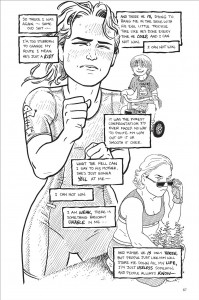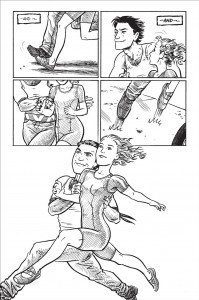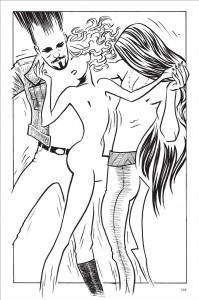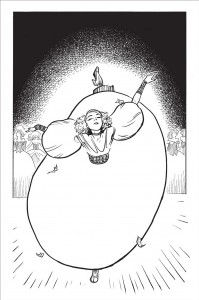Back in July, Noah complained that the lead character of Finder, a man named Jaeger, was a “drearily familiar archetype — the tortured tough-but-tender loner with heart-of, whose masculine ability to withstand pain functions as an excuse to subject him to hyperbolic and repetitive sensual violence, just as his mysterious outsider status turns him into a perpetually sexy invader of the quiet homes.” Noah will be glad to hear that that Jaeger never actually appears in Finder: Voice. On the other hand, he’ll be less than thrilled to hear that Jaeger is the driving force behind the plot and the preoccupation of the lead character, Rachel Grosvenor.
Backing up a bit, Finder is a comic series set in a far-flung future where humanity survived a global calamity and built a new civilization that’s quite different from our own. Most of the action takes place in the domed city of Anvard. The city is populated by a dozen or so clans that maintain strict genetic purity, so strict that members of the same clan are often indistinguishable from one another. There is also a pseudo-Native American race called the Ascians, who occasionally settle in Anvard, where they’re treated as second-class residents. Early chapters in Finder focused on Jaeger, a half-Ascian and the titular character, who specialized in finding lost things or people. Jaeger is the typical tough guy who can’t commit – he maintains an on-again, off-again relationship with Emma Grosvenor. Emma’s daughter Rachel has an unrequited crush on him as well.
Emma and Rachel are members of the Llaverac Clan. Llaveracs are composed entirely of beautiful blondes, and even the men are genetically altered to appear as women. In Finder: Voice, we learn that social rank among the Llaveracs is determined in a clan-wide beauty pageant, and the young women who place high in the competition are guaranteed a title, a house, and great wealth. Rachel naturally wants to win the pageant, not just for herself but so she can provide a comfortable life for her mother and sisters.
But things quickly go south for Rachel when she’s mugged and loses a precious heirloom that’s necessary to compete in the pageant. Rachel spends much of the story looking for Jaeger, hoping that he can use his tracking skills to help her find the heirloom. But it’s also clear that Rachel still has a crush on Jaeger, and she dreams that the manly-man will sweep her off her feet and save her from her crappy life.
At first glance, it is tempting to dismiss this as another retrograde fantasy where the young woman is saved by the dashing rogue. Except the dashing rogue never shows up. Rachel effectively saves herself and wins second place in the pageant without Jaeger’s help. And she does this through a distinctly female method: gossip, or more precisely the threat of gossip. Rachel learns a secret about a Llevarac clan elder and threatens to spill the beans unless she’s allowed to participate in the pageant.
So one could read Finder: Voice as a subversion of a male hero/female victim paradigm. But there are several complications to that interpretation. Rachel is stalked by one of Jaeger’s enemies for a good chunk of the story. And different men save her from physical harm on a couple of occasions. And there’s an unexpected plot development where Rachel participates in a drunken orgy with a group of Ascians (who subsequently move into her house).
Finder: Voice can be read as a story of female empowerment, but power is still envisioned as masculine (Jaeger). Rachel achieves great success in a girly way – a beauty pageant – but she still has to be saved from death by a group of friendly Ascian men. In other words, Rachel is not Wonder Woman or Buffy the Vampire Slayer. At the end of the story, she is still physically weak and uncertain about her future. And unlike the supernaturally tough Jaeger, Rachel is pathetically human.
And that’s probably why I enjoyed Finder: Voice far more than the earlier stories with Jaeger. In those, the reader is expected to identify and sympathize with Jaeger. But he is not an interesting character, given that he’s a pile of hyper-masculine cliches. But Jaeger is interesting as a pile of hyper-masculine cliches. Rachel wants Jaeger as a lover, but she also wants to be like Jaeger. She wants to be amazingly strong, hyper-competent, and emotionally untouchable. She wants to be Jaeger/Batman/Wolverine. She wants to be all those things that men are supposed to be, and she fails, largely because Jaeger is a preposterous role model. No one is that tough, competent, or untouchable. Instead, Rachel has to settle for being a human and a woman. She has to play by the rules of the Llaverac Clan. She has to be pretty and elegant for the sake of her family’s financial well-being. And she has to rely on others, because she will never have the brute strength to deal with every threat. Rachel is a character who is keenly aware of her limitations and obligations, and her successes are less about overcoming all obstacles than about achieving as much as one can within her limits.
For me, that’s more compelling than another story about a tough loner with a heart of gold.





